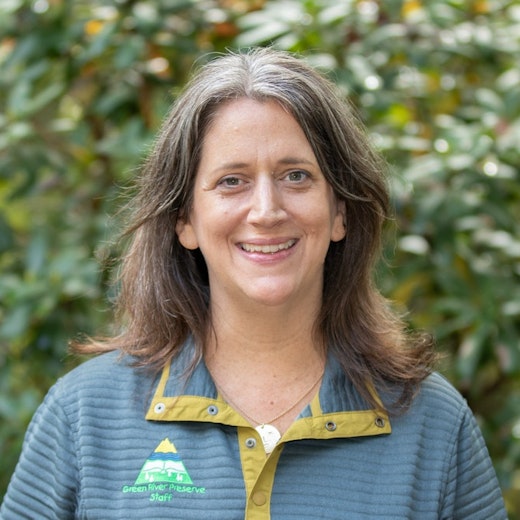
Americorps Partnership with GRP
The following was written by Meaghan Bonds - Former GRP camper, counselor, SEE staffer, and now awesome Americorps member & partner.
This is the first off-season at GRP I’ve ever experienced, and while I know I will miss the vibrance of the early season, the new shape the land is taking on in the absence of foliage invites a new perspective. I always imagined the preserve would feel lonely in the off season, but there is so much to be discovered in the sparsity and silence. In the absence of bus songs and cabin chatter, every snap of a twig can be heard as an animal tries to pass by unseen. As leaves nestle into the ground, the spaces they used to occupy reveal a line of sight that was not possible before, allowing us to take a closer look into the forest we may think we know so well. Recently, I witnessed several woodpeckers in conversation with one another as they searched for food in the high canopies of trees by Upper Council Fire. As I craned my neck to watch from far below, I realized that without this new lack of leaves, I would never have been able to see the details of that interaction.
In many ways I feel that my position here at GRP is exactly that which the changing of seasons has allowed: a new perspective that lets me to take a closer look at this place I am passionate about, and discover how I can best contribute to our mission in the off season. For the next ten months, I am serving at GRP as a member of Americorps and Resilience Corps NC, specifically focusing on bolstering our KALE program. I am so grateful to be at GRP in this new capacity, serving our outreach initiatives through these two incredible organizations. For those unfamiliar, KALE (Kids Agricultural Learning Experience) is an education program GRP hosts each spring that brings schools from our surrounding communities to our farm to have hands-on experiences of where our food comes from and our role in an agricultural ecosystem. Until March, when our first student groups will arrive, I am assisting Geoff, our incredible farm manager, to prepare the farm for the 2023 season. While it may seem like there is not much to be done on a farm in winter, there are many projects, both new and ongoing, that we are able to give our attention now that the bustle of summer and fall has subsided.
In addition to harvesting the last of our salad greens and muscadines, as well as preparing the ground for colder temperatures, Geoff and I have been taking a closer look at ways in which we can add to the farm’s functionality as an outdoor classroom, and even bring the farm to base camp. One project that is well underway is the repurposing of the herb area of the farm to be a new kind of educational garden. After clearing out some old vegetation (and adding it to our compost, of course), we have begun to put raised beds in their place in which we will be able to plant come early spring. This newly turned plot will allow kids to have their own designated space to really get their hands dirty- investigating plant structures, observing pollinators, and pulling things out of the soil- without disturbing the produce for our farm-to-table program. With a wide variety of vegetables and herbs, we hope that this new garden will always have something for farm visitors to harvest and try for themselves. In addition to the raised bed project, we have also begun to source and cut wood to construct a new walk-in brooder. Already a fan favorite, visitors to our farm will be able to learn about our chickens in a more accessible space that allows for an up close experience of these animals and their different stages of growth.
While there are many other new projects at the farm itself, I am particularly excited about the work we are doing at base camp as well. To better supplement the wonderful array of activities we have during pioneer cabin activities and related GLPs, we are revamping the back field garden by restructuring with raised beds and replanting a wider range of herbs, flowers, and vegetables. An echo of the garden we are creating down at the farm, this garden will feature plants that each have a specific function within the pioneer cabin curriculum. From cooking and brewing tea, to making traditional crafts and remedies, each plant in the new pioneer garden will serve as an ingredient for exploring the ways in which the natural world supports us and our needs. Preserving and passing on knowledge of and respect for the land through intentional use is an essential part of what we do at GRP, and I am so excited to help add to an activity that does this through applications of what we grow at the farm, and now at base camp! Just as the farm has become a greater part of my GRP experience with my new role here, I can’t wait to see how it becomes a greater part of campers’ experiences as well through the work we are doing this “off-season.”
